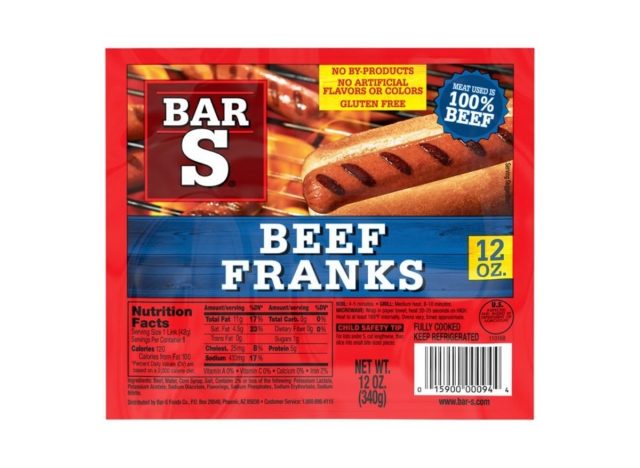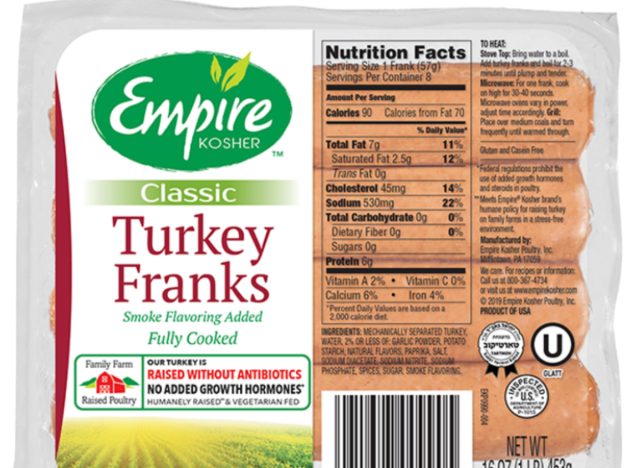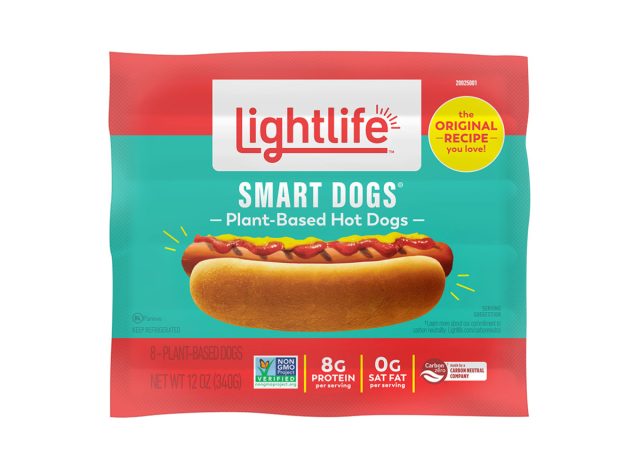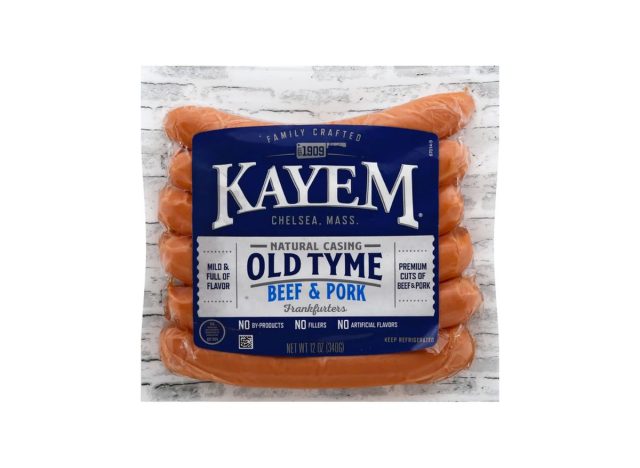The product recommendations in this post are recommendations by the writer and/or expert(s)
interviewed and do not contain affiliate links. Meaning: If you use these links to buy
something, we will not earn a commission.
No summertime cookout or trip to a ballgame is complete without a ketchup and mustard-laden hot dog. If you’re like me, you’re also piling your dog high with pickles, onions, and maybe even the occasional jalapeño pepper. While we can’t discredit the nostalgia and satisfying flavor that comes from the occasional hot dog, not all franks are created equal. Hot dogs are notorious for piling on sodium and saturated fat, two nutrients with a strong connection to heart disease. Some can even take the title of the world’s unhealthiest hot dogs.
The American Heart Association recommends only 5–6% of your calories from saturated fat each day. For a 2,000-calorie diet, that’s less than 13 grams of saturated fat each day. When it comes to sodium, you should aim for no more than 2,300 milligrams per day, ideally sticking to a 1,500 milligram per day limit. Beyond the direct effects that the saturated fat and sodium in hot dogs can have on heart health, recent research has found that processed red meat may increase heart disease risk in another way.
An August 2022 study published in Arteriosclerosis, Thrombosis, and Vascular Biology found that eating red meat, especially processed red meat such as hot dogs, increases the release of a chemical known as trimethylamine n-oxide (TMAO) by bacteria in the gut microbiome. High blood levels of TMAO are associated with a higher risk of heart disease, kidney disease, and type 2 diabetes.
All risks aside, hot dogs can occasionally be enjoyed as part of a healthy and balanced diet. The key is finding a hot dog with quality ingredients that taste good and won’t cause you to go overboard on your saturated fat or sodium for the day.
In your search, steer clear of these 7 unhealthiest hot dogs, according to dietitians. Also, for more healthy eating advice to help inform your next trip to the grocery store, be sure to check out The 20 Best & Worst Deli Meats, According to Dietitians.


PER HOT DOG: 230 calories, 20 g fat (9 g saturated fat), 45 mg cholesterol, 710 mg sodium, 2 g carbs (0 g fiber, 2 g sugar), 9 g protein
Ball Park Brand Prime Uncured Beef Franks is one of the unhealthiest hot dogs on the market because of its incredibly high sodium and saturated fat.
“Each hot dog has 710 milligrams of sodium, which is 35% of the daily recommended amount of 2,000-milligram daily,” says Wan Na Chun, MPH, RD. “They’re also high in saturated fat, which can raise LDL cholesterol levels.”
While Ball Park Prime Uncured Beef Frank has no added nitrites or nitrates and no added fillers or byproducts, each hot dog has 9 grams of saturated fat. If you eat two (like many people do when eating hot dogs), that’s 18 grams of saturated fat, or 138% of the recommended amount per the American Heart Association.


PER HOT DOG: 90 calories, 7 g fat (2 g saturated fat), 25 mg cholesterol, 410 mg sodium, 4 g carbs (0 g fiber, 1 g sugar), 5 g protein
The nutrition label on Gwaltney Original Chicken Hot Dogs indicates a relatively healthy option, with only 90 calories, 2 grams of saturated fat, and only 410 milligrams of sodium. Despite the impressive numbers, the ingredient list still has dietitians advising against them.
“Mechanically separated chicken involves a process that mechanically removes meat from the bones, resulting in a product that may contain high levels of fat, skin, and connective tissue, says Jessie Hulsey RD, LD, an Atlanta-based registered dietitian. “This highly processed meat raises concerns about the quality, nutritional value, and overall health impact of these hot dogs.”
READ RELATED: Critical Care To Elderly Home Care: How Skilled Nurses Are Ideal For Addressing The Issue?


PER HOT DOG: 130 calories, 12 g fat (4.5 g saturated fat), 30 mg cholesterol, 450 mg sodium, 2 g carbs (0 g fiber, 0 g sugar), 5 g protein
Bar S Classic Franks is bound to be one of the cheapest in the deli cooler. Nevertheless, these rank among the unhealthiest hot dogs mostly because they’re made using mechanically separated chicken and pork. You’ll find beef in them, but not much, since beef is listed on the ingredients in the “contains less than 2% of” grouping, which also includes a number of fillers and additives. One of the additives is nitrites, which research has found to be connected to a higher risk of breast and prostate cancer.


PER HOT DOG: 190 calories, 10 g fat (3.5 g saturated fat), 0 mg cholesterol, 660 mg sodium, 8 g carbs (1 g fiber, 2 g sugar), 16 g protein
“One significant drawback of Empire Uncured Turkey Franks is the use of mechanically separated turkey in their ingredient list,” says Hulsey.
Given that the label claims that the turkeys used to make these hot dogs are never given antibiotics and are never given growth hormones, it’s important to note that growth hormones and steroid use are prohibited in all poultry raised and sold in the United States. Label claims like these tend to make food look much healthier than it actually is. On the ingredient list, you can find sodium nitrite, a preservative found in many processed meats. A January 2023 study published in PLOS Medicine found that diets higher in nitrites were associated with a higher risk for type 2 diabetes.


PER HOT DOG: 190 calories, 10 g fat (3.5 g saturated fat), 0 mg cholesterol, 660 mg sodium, 8 g carbs (1 g fiber, 2 g sugar), 16 g protein
The Gardein Plant-Based Bratwurst may be a close taste and texture alternative for a traditional brat, but it’s not a healthier substitute. The theory that plant-based meat alternatives are healthier than their meat counterparts isn’t always true. Just one hot dog has 660 milligrams of sodium, or 28% of the amount recommended in a day, which is more than many meat-based franks.


PER HOT DOG: 60 calories, 2 fat (0 g saturated fat), 0 mg cholesterol, 350 mg sodium, 2 g carbs (0 g fiber, 1 g sugar), 8 g protein
“Despite their ‘light’ and plant-based claims, Lightlife Smart Dogs are highly processed hot dogs and include soy protein isolate in their ingredient list,” says Hulsey. “While soy protein isolate is often used as a plant-based protein source, it undergoes extensive processing that strips away many of the beneficial nutrients found in whole soybeans.”
“Additionally, some individuals may have sensitivities or allergies to soy, making these hot dogs an unfavorable choice for those with specific dietary needs,” Hulsey adds.


PER HOT DOG: 140 calories, 13 g fat (5 g saturated fat), 25 mg cholesterol, 430 mg sodium, 2 g carbs (0 g fiber, 1 g sugar), 6 g protein
While beef and pork are the top two ingredients, Kaymen Beef and Pork Hot Dogs also include corn syrup and sodium nitrite, two undesirable nutrients in hot dogs. With corn syrup as the third ingredient, these franks have 1 gram of added sugars. While one gram isn’t significant, hot dogs typically aren’t a source of added sugars.









![Lauren Sanchez Gives Damning Hint Jeff Bezos Engagement Is On The Rocks [PUBLISH ON NICKI]](https://safehomediy.com/wp-content/uploads/2025/03/Lauren-Sanchez-Gives-Damning-Hint-Jeff-Bezos-Engagement-Is-On-260x140.jpg)
